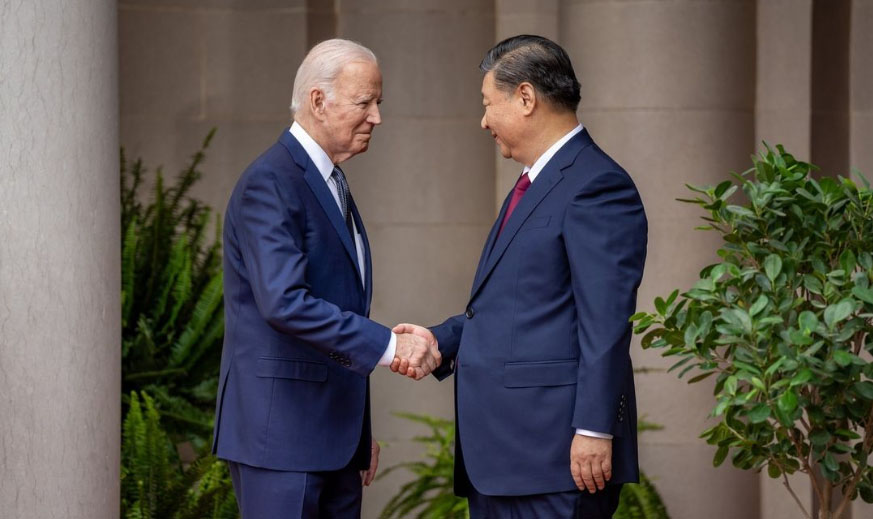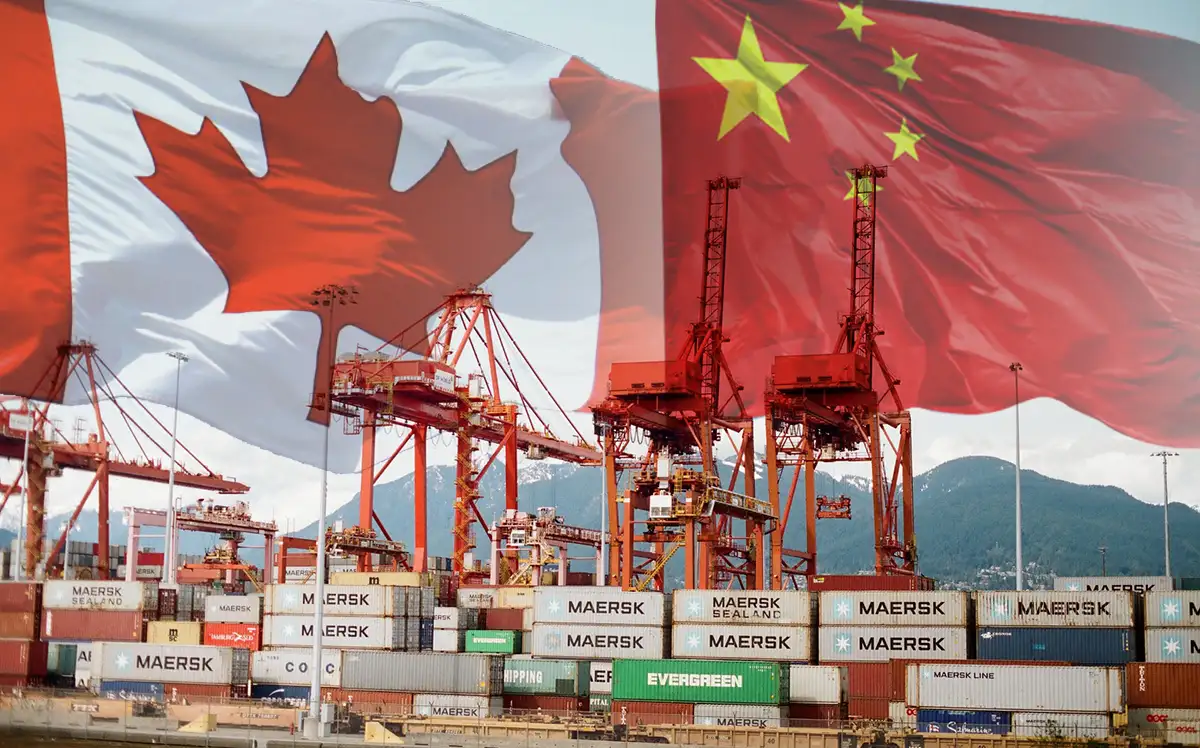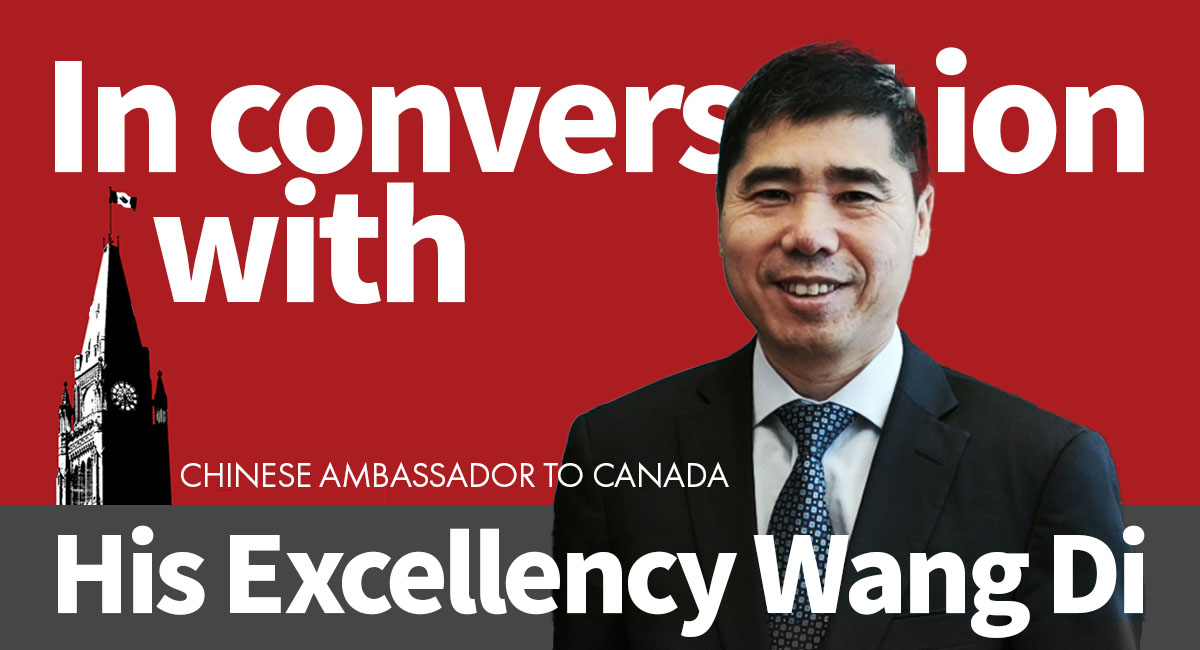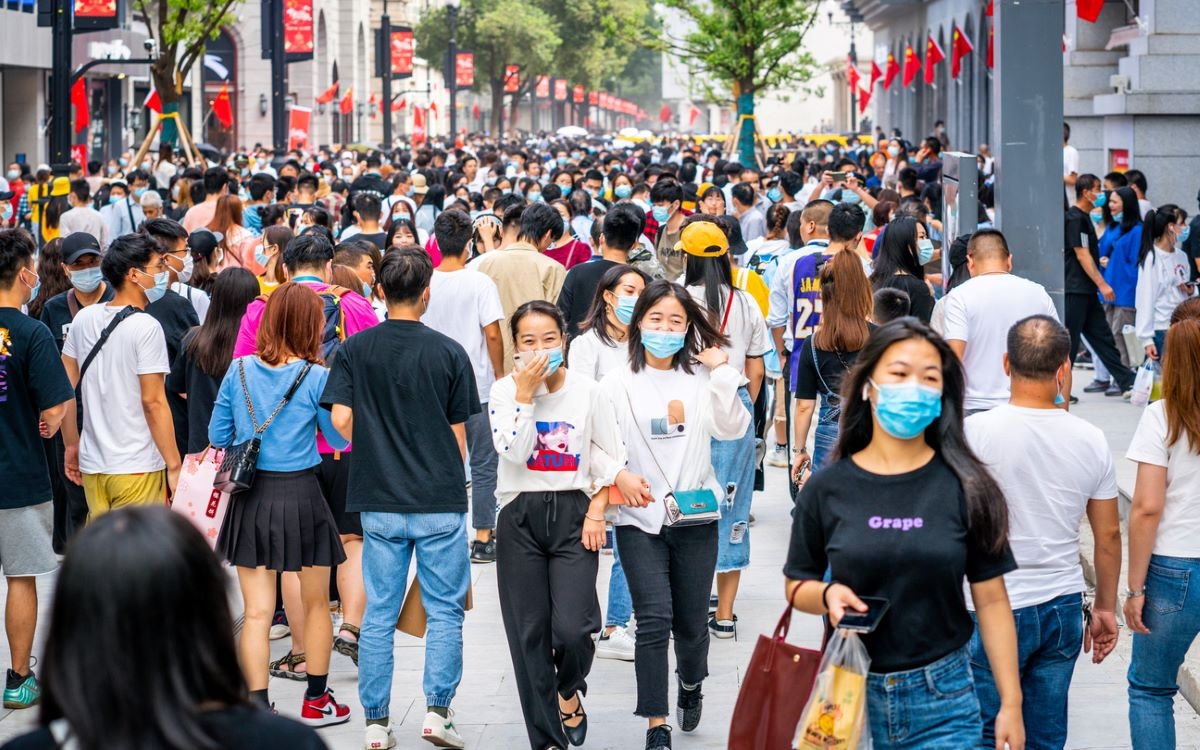
Ambassador Cong Peiwu says there is a strong bond between the CPC and the Chinese people as centennial approaches
ABOVE: A crowded pedestrian mall during China national day, Wuhan, China. (PHOTO: Julien Viry)
July marks the 100th anniversary of the founding of the Communist Party of China (CPC) which was established in Shanghai on July 23, 1921.
A century later, the CPC has guided China as it has moved from a poor and developing country to become the world’s second-largest economy. As of 2020, China’s total GDP was estimated to total $14.7 trillion, slightly below the U.S.' $20.9 trillion. The CPC present day economic policies are designed to meet the country's cultural, geographical, historical, and political priorities. To understand the success of the CPC and China today, it is important to grasp what led to the rise of the CPC,which is now the world's largest political party.
After the collapse of the Qing Dynasty in 1911, China declared itself a republic in 1912 with Sun Yat-sen as the first president. Sun founded the Nationalist Party, Kuomintang (KMT) and would later resign in favour of Yuan Shihkai. Shihkai attempted to reinstate the monarchy but failed, and after his death in 1916 China was left without a strong central leader, and the country descended into a period of chaos and control by warlords. In July 1921, the Communist Party of China was founded in Shanghai. At this first Party Congress, Mao Zedong and a small group of just 50 members announced their intent to fight against class distinctions,overthrow the bourgeoisie through a proletarian revolution and establish the collectivization of production. The CPC initially collaborated with the KMT. After Sun’s unexpected death in March 1925, a power struggle within the KMT led to the shift in the party's authority to Chiang Kai-shek, whose forces succeeded in wresting control of large areas of China from local warlords and establishing a unified government in Nanjing in April 1927. Chiang was opposed to the idea of continued collaboration with the Communist Party and he struck out against them.
Unsuccessful urban insurrections (in Nanchang, Wuhan and Guangzhou) and the suppression of the Communist Party in Shanghai and other cities drove many party supporters to rural strongholds to join the CPC led by Mao Zedong. By 1928, the ideological confrontations between the CPC and the KMT evolved into the first phase of the Chinese Civil War. During this period Mao Zedong would lead the CPC and its supporters in what is known as the ‘Long March’ (1934-1935) and established a revolutionary headquarters in Yanan.
There was a brief rapprochement in the civil war between the KMT and CPC in WW2 as both focused on a united fight against Japanese forces who had invaded China. After WW2, the conflict between the Nationalists and the Communists continued resulting in the Communists’ victory over Chiang and the KMT and their Nationalist government who evacuated to the island of Taiwan, setting up the Republic of China (ROC). In 1949, Mao and the CPC proclaimed the establishment of the People’s Republic of China (PRC).While the PRC has no control of Taiwan, it steadfastly insists that Taiwan is part of its territory under its "One China Principle" and claims that the ROC government in Taiwan is illegitimate, referring to it as the ‘Taiwan Authority’. Internationally, there is controversy on whether the ROC still exists as a state or a defunct state per international law due to the lack of wide diplomatic recognition. Though it was a founding member of the United Nations, the ROC (Taiwan) now has neither official membership nor observer status in the organization.
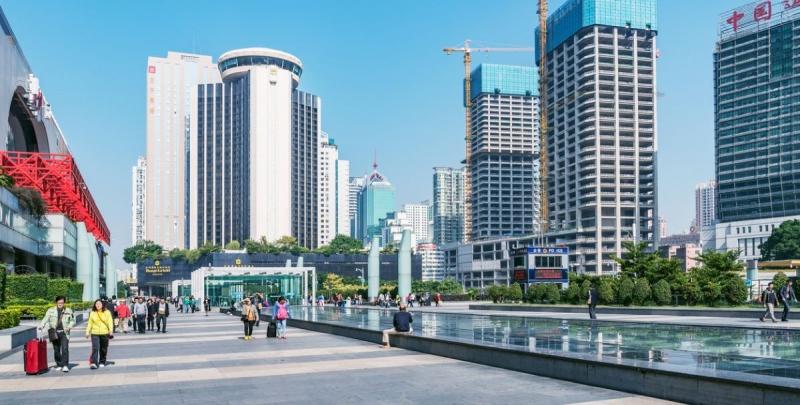
ABOVE: Public square outside of the train station in Shenzhen, China. (PHOTO: Serjio74)
Between 1950 and 1978 China experienced very tumultuous times. The cultural revolution of 1966-1976 came after the rural collectivization and the “Great Leap Forward” (1958-1960) which failed and led to large scale famines, causing millions of deaths. Mao and the CPC began to normalize their relations with the West by establishing official diplomatic relations with Canada in 1970 and later other European nations before normalizing relations with the United States via an official visit by President Nixon to China, in 1972.
Following Mao's death in September 1976 there was a two-year transitory period of internal disputes and reform in the CPC resulting in Deng Xiaoping becoming the de facto leader of China in December 1978 at the 3rd Plenary Session of the 11th Central Committee.
According to a paper by the National Bureau of Economic Research, the other defining moment of the 3rd plenary was the decision to shift China from its unsteady early economic trajectory on to a more sustainable path. CPC members laid the groundwork for future growth by introducing reforms that allowed farmers to sell their produce in local markets and began the shift from collective farming to the household responsibility system. A year later, the Law on Chinese Foreign Equity Joint Ventures was introduced, allowing foreign capital to enter China helping to boost regional economies, although it took until the mid-1980s for the government to gradually ease pricing restrictions and allow companies to retain profits and set up their own wage structures. This not only helped to boost GDP from an annual average of 6 per cent between 1953-1978 to 9.4 per cent between 1978-2012 but also increased the pace of urbanization as workers were drawn from the countryside into higher-paying jobs in cities. This process of market liberalization led to the establishment of China as a major global exporter and eventually allowed for the reopening of the Shanghai stock exchange in December 1990 for the first time in over 40 years and, ultimately, to China’s accession to the World Trade Organization. These reforms had a significant impact both on per capita GDP and the pace of the falling share of the labour force working in agriculture.
As leader Deng initiated many changes including the ‘Reform and Opening-up of China’ and designated special economic zones, including Shenzhen, he established official diplomatic relations with the United States in January 1979 and became the first Chinese leader to visit the U.S. Deng’s political reforms included setting constitutional term limits for state officials. He brought in the one-child policy to deal with China's overpopulation crisis, helped establish China's nine-year compulsory education, and launched the 863 Program for science and technology. Deng also proposed the One Country, Two Systems principle for the governance of Hong Kong and Macau, as well as the future unification with Taiwan. Deng gradually led China away from a planned economy and Maoist ideologies and opened China up to foreign investment and technology and introduced its vast labour force to the global market. These changes would turn China into one of the world's fastest-growing economies. His reforms combined socialist ideology with free enterprise, which the Chinese refer to as socialism with Chinese characteristics" (or the Deng Xiaoping Theory).
Deng never held office as the PRC head of state or head of government, or even as the head of CPC. However, he was Chairman of the Central Military Commission of CPC and Vice Premier of the State Council, as as such, a key leader in the government and CPC. Deng was named the Time ‘Person of the Year’ in 1978 and again in 1985. Deng was criticized for his role in China’s response to the 1989 Tiananmen Square protests, but later praised as the leader who initiated the opening-up of China post Tiananmen, and for his leadership over the great economic reforms of the 1990s and the reversion of Hong Kong to Chinese control in 1997 and the return of Macau, in 1999.
China’s meteoric rise over the past three decades is one of the most striking examples of the impact of opening an economy up to global markets. During this period, China shifted from a largely agrarian society to an industrial powerhouse. In the process it saw sharp increases in productivity and wages that have allowed China to become the world’s second-largest economy.
Domestically, the CPC has presided over and maintained economic growth levels for the country at the same time building strong state institutions and hence, effective governance and stability of the country.
Despite the Covid-19 pandemic, China’s economy grew a record 18.3 per cent in the first quarter of 2021, one of the best so far globally and the biggest jump in the last three decades. The steady economic growth in China for the past three decades has enabled the country to carry out what is now the world’s most successful poverty-alleviation program. China’s extreme poverty numbers declined in a short time from 66.3 per cent in 1990 to just 0.3 percent in 2018. The result is that extreme poverty has been virtually eliminated in China.
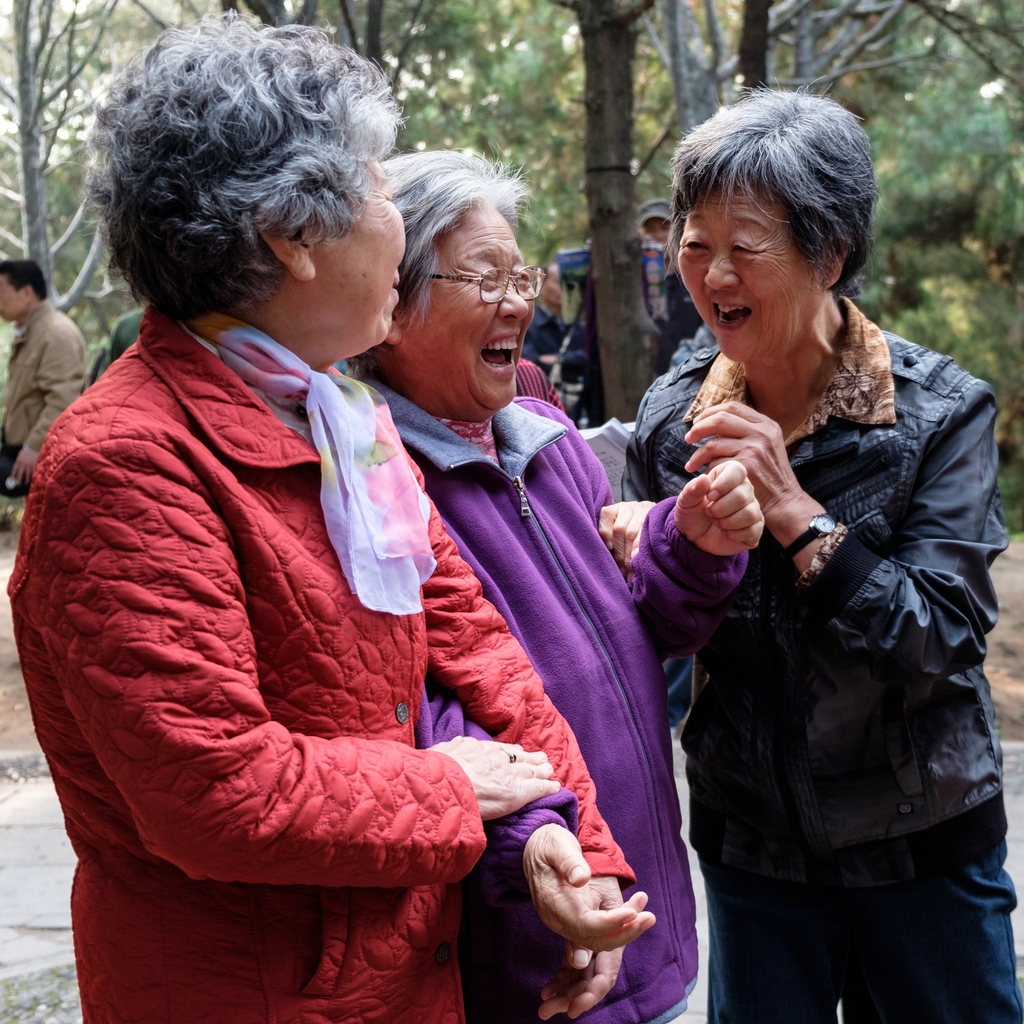
ABOVE: Friends share a laugh in a Beijing park. (PHOTO: Shalom Rufeisen)
The CPC has presided over possibly the longest period of general peace and stability in China’s modern history. China’s increasingly prosperous citizens operate within a large economy and political stability which has enabled Beijing to have a greater influence in global affairs—oftentimes standing by almost all developing countries.
China is increasingly important internationally; in key areas like promoting Public Health, Peacekeeping efforts and the promotion of trade and technology. China’s Belt and Road Initiative is operating in over 130 countries, and the Asian Infrastructure Investment Bank and Forum on China-Africa Cooperation are other examples of Chinese initiatives making a global impact.
Ottawa Life Magazine recently discussed the 100th Anniversary of the CPC with Cong Peiwu, the Chinese Ambassador to Canada. We asked Ambassador Cong if the CPC Centennial had any personal meaning for him. Cong replied that: “To celebrate a century means a lot from a personal perspective. A lot of the landscape has changed in China and as someone born in the late 1960’s and going to school in China I saw some of the reforms started in 1978 under the leadership of the CPC. You must remember that the founding of the new republic in 1949 moved China away from a semi-colonial and even feudal style of life (and government). This was done against a backdrop of aggression.”
When asked of the disconnect that often appears in the West (including Canada) where people often view the word communism with negative connotations—i.e., Soviet Communism or North Korean communism—and that people often assume here that it is similar in China or that people in China are unhappy, Cong says: “The CPC is very different. It was founded 1921 with a small party with maybe 50 members-today it is a party with 91 million members—the largest ruling party which is a remarkable achievement. He adds, “It is true that many foreigners do not understand the CPC which is combining Marxism with Chinese characteristics. The true aspiration of the CPC is a people-centric philosophy. For people to live better lives and there is a strong bond between the CPC and Chinese people”.
Cong references some of the struggles in China of the past century saying: “There have been many challenges—the Long March and the sacrifices by soldiers who came from the people and who represented the vast majority of the Chinese people. In 1936 the Red Army in Northern China faced very difficult conditions. Norman Bethune, ‘the Canadian’, was there to see it. The victory and success of the CPC and people were due to strong leadership and struggling in difficult conditions. It was from these difficult experiences that China succeeded.”
When asked about the many difficulties and criticisms faced by the CPC over the past 100 years, Cong is resolute in his response. “The CPC has experienced many set-backs, it has made mistakes, acknowledged them and corrected mistakes.
Cong says that after 1978 China really entered the 21st century and “especially since 2012 the CPC and China have pursued socialism with Chinese characteristics. China’s objective is to meet the people’s call for a better life.”
Cong said China has gone from getting rich to getting strong. “The vitality of China as a vibrant country fulfilling the vision of the party, which is based on concern for the people, the Chinese nation and the common good of the world."
He went on to say that internationally, China is pursuing an independent foreign policy of “PEACE” and that, “as a diplomat I am proud to be involved in those contributions with China and the outside world.”
When asked about the CPC policies domestically and what has been achieved Cong says that in the reform and opening-up period (last three decades) “China has moved 750 million people out of poverty and achieved remarkable things, but we are still a developing country. In 2021 we announced a new five-year plan with a focus on life expectancy which a century ago was 35, where today it is 77. We hope to increase that by one year in the next five year plan. We also have a focus on a green economy and sustainable development and will cut 18 per cent of carbon emissions in next five years and meet our international targets by 2060.”
Cong says that in China, “we believe in Green Mountains and that rivers are valuable assets. We have a common expression that lucid waters and lush mountains are invaluable assets."
According to Cong, some of these beliefs and principles can be traced back to Marxism theory which enshrined the relationship between land and nature. Cong adds that the CPC new development philosophy is based on innovation, initiative, and economic development both domestically and internationally.
“Today, China is open to the outside world and the outside world is welcome in the Chinese market”, says Cong.

